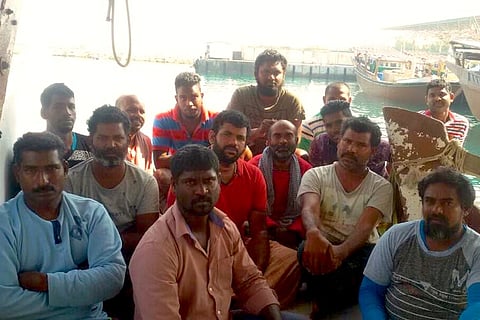

All Indian migrants have been advised not to take up fishing jobs on trawlers or vessels leaving from Saudi Arabia, UAE and Bahrain, and moving towards Iran, by the government of India.
In a special advisory released by the Protector General of Emigrants, all registered recruitment agents and Protector of Emigrants offices in India have been advised not to process any applications from potential migrants who are looking for jobs on fishing vessels in the three countries, which may move towards Iran.
The move has come since several Indian fishermen have been arrested from fishing vessels for allegedly venturing into Iranian waters. They are kept under custody in Iranian ports by the country’s Coast Guard, and it takes months for the fishermen to prove their innocence and reach their destination.
On October 22, 2017, for instance, fifteen fishermen from Kanyakumari, Tirunelveli and Thoothukudi districts in Tamil Nadu, who were employed in a Dubai trawler, were taken into custody by Iranian Coast Guards.
“After the arrest, we were taken to Kish Island and were put up there under their surveillance. We were clueless on what to do. An Iranian court had also imposed a fine – which our employer paid later. But we struggled for food and water too,” Antony Susai Blesson, a rescued fisherman from Tirunelveli, tells TNM.
“We won’t forget the struggle we went through while we were in the custody of Iranian Coast Guard,” Blesson adds.
Sr Josephine Valarmathi from the National Domestic Workers Movement in Chennai, who worked on the release of fishermen from Thoothukudi, says that fishermen landing in troubled waters has become a recurring issue, and rescuing them is a difficult task. "In some cases, it takes months to force authorities to act. And in this time, the fishermen’s families undergo a horrible situation without money and support,” Valarmathi says.
However, Valarmathi warns against a blanket ‘ban’ on fishing jobs, and says this cannot be the solution from the government.
“As most of the fishermen who migrate to the Gulf are from Tamil Nadu, we have handled several such cases in the past. It’s the right of person to migrate and find a job. Government should not stop them by putting a blanket ban,” she says.
Arul Antony from the National Domestic Workers Movement says that a better solution would be to work on India-Iran bilateral treaties.
“That’s the practical solution,” he says. “A ban is not a good move.”
On the other hand, Deepak H Chhabria, Chairman at Varsha Consultancy Services Pvt Ltd in Mumbai, a registered recruitment agency, welcomed the Indian government’s move.
“Poor Indians are trapped by being offered such jobs. And eventually, when they land in trouble, there is nobody to help them. It is better that we be cautious rather than struggle after landing in trouble,” Deepak says.
According to government data, the largest number of fishermen working in the Gulf Cooperation Council (GCC) countries on board fishing vessels are from Kanyakumari in Tamil Nadu.
Rafeek Ravuther, director at the Centre for Indian Migrant Studies (CIMS), says that nationals in Gulf countries rarely work at sea on fishing vessels.
"Though boats are owned by them, workers are mainly employed from India and Bangladesh,” Ravuther says, adding that the money offered by employers lure fishermen from places like Kanyakumari to the Gulf.
A recent study released by Centre for Development Studies (CDS) in India on migration claims that at least one out of every 20 households in Tamil Nadu, predominantly along the coastal belt, includes migrant workers in Gulf and South Asian countries.
Ravuther says that most of them migrate on visas without knowing what kind of visa it is, which can cause problems later on.
"And when they land in trouble, it becomes complicated to rescue them,” Ravuther says.
As per the Ministry of External Affairs, there are 74 Indians jailed in Iran, but it is unclear whether all of them are fishermen.